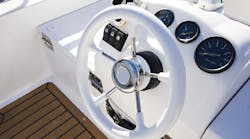The Case of the Engine Room Electrocution
All too often, I hear electrical workers say that adhering to the Code is all that's required to avoid negligence in electrical system design. The reality is that stopping at mere adherence to applicable codes can, in some circumstances, be the first motion in a race to the courthouse steps. The law requires that you consider and properly resolve foreseeable risks to avoid being found negligent. What many in the industry may not know is juries can consider the facts of a case and reasonably conclude that applicable codes fall short of resolving all foreseeable issues.
In this “Forensic Casebook,” a layperson lost his life as the result of an electrical contact in the engine room of a boat. After this tragic accident, it was questioned if those tasked with designing and maintaining the electrical system did all they should have to make the electrical environment safe.
The scene
The victim in this case was not an electrical worker, but rather a boat owner who chose to work on his own vessel, a 40-ft power boat securely tied to a dock in a marina. Power to the main panel in the vessel was supplied via a proper 30A cord connected to the designated shore power outlet on the dock, using proper locking 30A connectors.
The accident
On the day of the incident, the vessel owner was working in the engine compartment, using a metal fish tape to route a wire from the engine compartment through a conduit into the vessel's main power supply box. The box was energized (shore power connected), presumably to provide necessary lighting in the rather cramped, dark and dank space of the engine compartment. At some point, the fish tape contacted the energized 120V bus in the vessel's power box, conducting current from the bus to the victim, who was later found dead in the engine compartment.
Burn evidence confirmed that the entry point was the decedent's right hand, which he was using to feed the fish tape. Burns matching the diamond plate on the engine room decking were noted on the decedent's right knee as well. Because the accident took place during the height of summer, it's reasonable to infer that the cramped engine compartment space was hot and that the humidity was elevated — as it would be very likely that the bilge on a vessel in the water would not be dry.
I was retained by counsel for the estate of the deceased to analyze the electrical environment and reconstruct the incident. In this particular case, my expertise, which is typically limited to electrical accident reconstruction and effects of electricity on the human body, was extended to include knowledge specific to electrical safety on vessels. Having lived on vessels, captained boats in charter, and maintained my own vessels (up to 60 ft in length), I was keenly familiar with marina electrical environments.
Investigation and analysis
Analysis of the incident was fairly straightforward. It was likely that the current flow interfered with the decedent's heart, causing fibrillation and leading to his death. However, there was an alternative possibility — that the current caused interference with the decedent's respiratory muscles, leading to a much more painful and horrific death by suffocation.
In either case, the decedent was trapped and unable to free himself from the electrical environment. Because the current exceeded the let-go current, the victim could not release the energized fish tape. Furthermore, the floor of the engine compartment was metal, providing an obvious pathway to ground. Literally trapped on the floor, there was no way for the victim to break the contact.
Additional findings
These facts served as just the beginning of my analysis of the electrical environment. Although I do not consider myself a Code expert, a review of the NEC seemed to clearly indicate that the circuit to which the boat was connected required only a proper breaker and was specifically excluded from the need for a ground-fault circuit interrupter (GFCI). Article 555 distinguishes between outlets designated to provide shore power to vessels and those used for other more general purposes. “Other than shore power” outlets are specifically required to be ground-fault protected while shore power outlets are not.
The defendant marina owner had a clear argument that the marina had adhered to the applicable Code rules — and that it had no duty to ground-fault protect the shore power outlet for the vessel.
If negligence was limited to circumstances of Code violations, this case would have been over before it even started. The death, while tragic, could be attributed to a series of questionable decisions made by the boat owner for which the marina management could not be held responsible. After all, the decedent had chosen to leave the shore power connected and to use a metal fish, which together created the hazardous electrical environment leading to the electrical contact and his death.
However, under the law, liability risk does not end with adherence to the Code. Generally, those with superior knowledge have a higher duty to those with lesser knowledge. The marina management unquestionably had a higher knowledge of the risk of electrocution in a marina environment than a typical boat owner would have. Ultimately, the question for a jury would have been what risks were foreseeable to the marina management, what their duty would have been to protect the boat owner from the foreseeable risks, and what proper resolution of those risks would have been. In addition, the jury would have to decide if this type of incident was foreseeable and if the marina management had a duty to go beyond the applicable Code and ground fault protect shore power outlets in the marina.
The verdict
As with so many of these types of accidents, this case settled for an undisclosed amount long before it could be argued in court. Perhaps the defendant saw how great damages for a loss could be, and the plaintiff recognized the uncertainty of predicting a win.
In reflection
In modern vessel construction, it's common practice to ground-fault protect all electrical outlets, which were not protected on the vessel on which the incident took place. Under the circumstances, however, it would not have mattered — because the accidental contact was with the power bus, which would have been on the wrong side of the ground fault protection in most cases. The best way to provide ground-fault protection against contact with the power bus would have been to protect the whole vessel by having ground-fault protection on the dock prior to the shore power connection, which is specifically excluded in the applicable Code.
In my expert opinion, it should have been absolutely foreseeable to the marina management that people with lay-knowledge of electricity would be working in the electrically risky environments of their boats without disconnecting the shore power. Furthermore, it's common practice at marinas for dock workers to use inexpensive adapters to convert 30A shore power outlets into standard 15A, 120V outlets to operate power tools, pressure washers, buffers, and the like. Of course, the marina has knowledge of this practice. The common use of such adapters, which make shore power outlets usable as outlets for other purposes, would render all shore power outlets in the category of outlets requiring GFCI protection under the Code.
The marina has one argument of substance against using GFCIs to protect shore power outlets. The reality is that boat electrical systems are often exposed to damp and salty environments, leading to system wear and current leakage that, over time, would cause many possible false GFCI trips, especially in large marinas. The presence of GFCIs protecting shore power outlets would also burden boat owners with the additional expense of maintaining their electrical systems to a higher (albeit safer) level than is typical. In addition, such trips would turn off power to vessel battery chargers, which are necessary to keep the batteries charged so as to provide power to the vessel bilge pumps. A GFCI trip on an unoccupied vessel would expose the vessel to risk of sinking without a working battery charger to keep bilge pumps operable.
Lessons learned
Ultimately, it's a balancing act between protecting human life and the risk of loss of property, which would be substantially abated by expecting boat owners to maintain their electrical systems properly. The risk of property loss could be further reduced if the marina could be alerted to tripped GFCIs on shore power outlets by installing inexpensive alarm systems that sound when the dock shore power GFCI trips (estimated at less than $20 per slip).
What started out as a simple and easily analyzed electrical contact case proved far more complex. There are extensive issues in this scenario that should have been considered and addressed by those who designed and maintain the marina's electrical environment. Electrical safety begins with adherence to the applicable code but does not end until all foreseeable issues of electrical design and human interaction with electrical systems have been addressed and resolved.
Had this case been litigated to a conclusion, a jury would have had to answer the question of what should have been foreseeable to all involved parties. It also would have had to decide how to properly balance the risk of loss of life with the economic risk and impact of loss of property in the design and management of the marina's electrical environment. Ultimately, a jury would decide where that balance properly exists — and if the Code is inadequate for assuring proper electrical protection at marinas. For the marina designers and management, mitigating injury risk, property loss, and liability exposure requires considering the same questions that might have been posed to a jury — and basing design decisions on the best assessment of how a jury might answer.
Dr. Morse is a researcher, consultant, and full professor of electrical engineering at the University of San Diego. He can be reached at [email protected].


